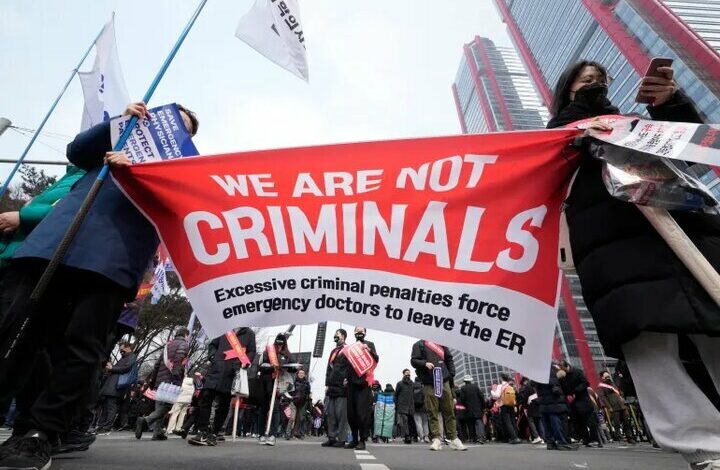The process of suspending the medical license of protesting doctors in South Korea began

| The South Korean government has announced that it has begun the process of suspending the work permits of thousands of protesting doctors in the country. |
reported by Mehr News Agency, the South Korean government announced on Monday that it has started the process of suspending the medical licenses of more than 4,900 new doctors, who recently stopped working in protest against the authorities’ action to increase the education quota in the field of medicine.
Agence France-Presse reported that “Chun Byung-wang” from South Korea’s Ministry of Health officials, in a conversation with reporters, announced that the government has issued an administrative warning to trainee doctors who have violated and disobeyed the order to return to work. and since March 8, this administrative notice has been sent to more than 4900 of them.
On March 14, following a massive strike by South Korean medical trainees who ignored the government’s deadline to end the protests, Seoul threatened to suspend the protesters’ medical licenses.
The strike of about 9,000 medical interns on February 20 led to the cancellation of a number of surgeries and treatment procedures, as well as disrupting the operation of hospital emergency units.
South Korean Health Minister Cho Kyuhong announced in response to these protests that officials will visit hospitals and if doctors do not return to work according to regulations They will be dealt with.
The doctors who went on strike are a part of South Korea’s 140,000 medical community, but this part represents 40% of all doctors in some of the country’s major hospitals. are. Thousands of doctors took to the streets of Seoul yesterday in a massive protest organized by the Korean Medical Association. The protesting doctors say that the government should first take care of doctors’ salaries and working environment conditions, and then increase the admission of medical students.
Under South Korean regulations, doctors are prohibited from striking. The government of this country says that the decision to increase the number of students admitted to medical schools by 2000 from 2025 is mandatory and the reason for this is the increase in the elderly population and also the mismatch of the number of doctors compared to patients. Seoul has 2.6 doctors per 1,000 people, and this figure has made South Korea one of the countries with a small medical community among developed countries.


